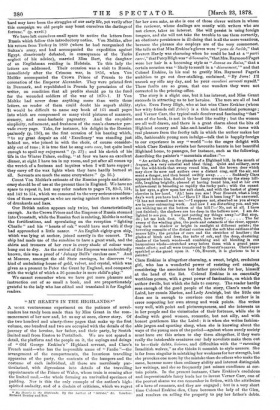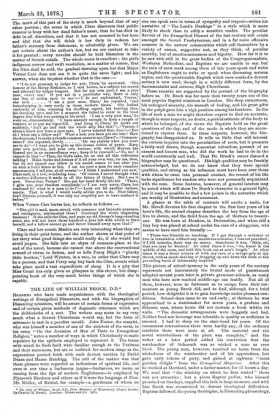" MY HEART'S IN THE HIGHLANDS.*"
A monn venturesome experiment on the patience of novel- 'readers has rarely been made than by Miss Grant in the com- mencement of her new and, let us say at once, clever story. Of 'the two hundred and ninety-three pages that make up the first volume, one hundred and two are occupied with the details of the journey of the heroine, her father, and their party, by Scotch limited mail from Euston to Portalloch. We are not spared a detail, the platform and the people on it, the sayings and doings of " Old George Erskine's " Highland servant, and Clare's French maid—who has the impossible name of " Fanlie "—the arrangement of the compartments, the luxurious travelling apparatus of the party, the contents of the hampers and the costume of each individual, all these are mercilessly par- ticularised, with digressions into details of the travelling appointments of the Prince of Wales, whose train is coming after the limited mail,—the whole forming an unrivalled specimen of padding. Nor is this the only example of the author's high- spirited audacity, and of a disdain of criticism, which we regret • My Heart's in the Highlands. By the Author of "Artiete," &e. London: Richard Bentley and Son.
for her own sake, as she is one of those clever writers in whom the reviewer, whose dealings are mostly with writers who are not clever, takes an interest. She will persist in using foreign tongues, and she will not take the trouble to use them correctly, an obstinate persistence in ill-doing that is all the more vexatious, because the phrases she employs are of the very commonest. She tells us that Miss Erskine's gloves were "peau de Swede," that Everett Hardy was charming when he could be had at a "parti came," that PercyBligh was " delonnaire," that Mrs. Raymond Paget wore her hair in a becoming style as "Jeanne au Bains," that a certain occasion was " likely to result in a ' denouement,'" and that Colonel Erskine, in his zeal to gratify Mrs. Raymond Paget's ambition to go out deer-stalking, exclaimed, "By Jove! I'll uncock my rifle any day, and be your cavalieri serventi myself." These faults are so gross, that one wonders they were not corrected in the printing-office.
The story is a slight one, but it has interest, and Miss Grant succeeds in attracting us to her heroine. The men are all of bad styles. Even Percy Bligh, who at last wins Clare Erskine (whom her witty friends call Éclair) is a thin and theatrical personage ; and Verner Carr, the typical male deceiver and fascinating "fast " man of the book, is not in the least like reality ; but the women are all well drawn, and there is a great charm about the bits of Highland scenery and lake-and-heather life. One turns with real pleasure from the frothy talk in which the author makes her idle, fashionable young men indulge—talk that is happily foreign to our experience in any " world "—to the eager delight with which Clare Erskine revisits her favourite haunts in her beautiful Highland borne, to passages, for instance, such as the following, describing the painter's " mountain studies :"—
" An artist's day, on the pinnacle of a Highland hill, in the month of August, is a very celestial and ideal thing. Quiet and solitary, save for the wild-birds that swoop round him, and the brown deer which may show its nose and antlers over a distant crag, sniff the air, and
scent a danger, and then bound swiftly away Suddenly Clare appeared before him, flushed by her hasty scramble up the steep hill- side, laughing brightly, pleased at having found him, and at her own achievement in breasting so rapidly the rocky path ; with the sunset in her eyes, a glow upon her soft cheek, and with the basket of glossy cherries in her hand. 'Ah! here you are ! Poor Everett, what a long day's work you have had.'—' Have I 7 Has it been long ?' he answered. ' It has not seemed so to me.'—'I suppose not, absorbed as you always are in your entrancing work. And now I am disturbing you. and you are wishing me at the bottom of the hill l'—' No, not at all. I have just finished ; the shadows are too deep in the hollows now. I am de- lighted to see you. I was just putting my things away.'—' But stop,
do ; let me look first. Oh, Everett, how lovely t The far sweep of the winding glen, the pools and cataracts of the river, appear- ing dark in shadow or bright in sunlight at different points ; the towering summits of the distant cornea and the soft blue outlines of the nearer hills ; the patches of corn and the stretches of heather ; the glades of birch and fern, the tufts of oak, and the deep, clustering shades of the beech woods—all combining and all blending in one harmonious whole—stretched away before them with a grand pano- ramic effect ; and all were transferred to Everett's canvas. Clare's eyes sparkled as she gazed upon it. Oh, Everett, it is glorious to be a painter."
Clare Erskine is altogether charming, a sweet, bright, credulous girl, who has a wonderful power of resisting evil example, considering the associates her father provides for her, himself at the head of the list. Colonel Erskine is an essentially
worthless person, with a great power of fascination, on which the author dwells, but which she fails to convey. The reader hardly
sees enough of the good people of the story, Clare's uncle the Laird, her cousin Marion, and Lady Arnleigh, but the little one does see is enough to convince one that the author is in error respecting her own strong and weak points. She writes very well, with point and picturesqueness, and she interests us in her people and the vicissitudes of their fortunes, while she is dealing with good women, romantic, but not silly, and with honest gentlemen like the Laird ; it is when she writes fashion- able jargon and sporting slang, when she is knowing about the ways of the young men of the period—against whom surely society must have ere this arisen to slay them altogether, if they were really the intolerable creatures our lady novelists make them out to be—their debts, liaisons, and difficulties with the " ravening Israelitish wolves," as she thinks it mannish to style usurers. She is far from singular in mistaking her weakness for her strength, but she provokes one more by the mistake than do others who make the same, because more than ordinary ability and interest distinguish her writings, and she so frequently just misses excellence at cer- tain points. In the present instance, Clare Erskine's credulous and impressionable fancy leads her to invest Verner Carr, one of the poorest shams we can remember in fiction, with the attributes
of a hero of romance, and they are engaged ; but in a very short time Colonel Erskine dies, Clare becomes the lady of the Glen, and resolves on selling the property to pay her father's debts.
The merit of this part of the story is much beyond that of any other portion ; the scene in which Clare discovers that public rumour is busy with her dead father's name, that he has died in debt in all directions, and that it has not occurred to her hero and idol that she will think it her duty to redeem her father's memory from dishonour, is admirably given. We are not certain about the author's law, but we are content to take it for granted ; every novelist should be held blameless in the matter of Scotch entails. The whole scene is excellent ; the girl's indignant sorrow and swift resolution, as a matter of course, that the Glen shall be sold, the gradual dawning upon her that Major Verner Carr does not see it in quite the same light ; and his answer, when she inquires whether that is the case:-
"'Ido not presume to judge for you, Clara,' he answered. ' The honour of the Moray Erekines, as I said before, is a subject too sacred and ethereal for vulgar tongues. But for my own part, I am a poor man, sweet one ! If you act in a particular way, there is only one line of action open to mo.'—' I do not understand, Verner,' she said am a poor man, Clare,' he repeated, 'and housekeeping is very costly in these modern times.' She looked curiously at him, scanning his shuffling aspect, his bending face, his drooping eyes, and for a moment she failed to enter in the least degree into what was passing in his mind. ' I am a very poor man,' he went on, disconsolately. I have scarcely enough to keep a couple of hunters, or to pay my cigar-bill. And hang it, Clare,' he spoke out suddenly, don't go and sink the whole ship like this !"—' Verner, I always knew you were a poor man. I never minded that, dear.'—' But oh ! what can a fellow say? What a hole you have got me into ! How
the deuce am I to make you talk common-sense to me, Clare Com mon-
sense ?' she repeated, slowly Do say plainly what you want me to do.'—' I want you to give up this insane notion of yours. Keep your own position, and your own fortune, with which Heaven has blessed you in an extraordinary way ; keep it to yourself.'—' No, no I cannot do that.'—' Then, for God's sake, let us end all this ridiculous talking I Make ducks and drake. of it all your own way, for me, then, but do not expect any fellow in his sound senses to run after you on such a fool's dance as this. I am too poor a man for such romantic amusements, I tell you, at all events.'—' I think I understand you now,' Clare said, in a low, wondering tone. 'Of course, I never thought what a curious difference it made in all the future of things. But I see it
now. Never fear, Verner !' She put her hand firmly into There, I give you your freedom completely.'—' I am very sorry, Clare, but confound it ! what is a man to do Look out for another heiress, surely. That is what I would really advise you to do. Poor fellow, don't distress yourself, it was only my stupidity not to have realised it before.'"
When Verner Carr leaves her, he reflects as follows :—
"The girl is mad, moon-struck with romance and Quixotic nonsense, and outrageous, sentimental ideas I Confound the whole disgusting business! If she sells the Glen, and pays up old George's long-standing score, she will not have three hundred a year left with which to bless herself, and a fellow cannot go and throw himself away upon that 1" Clare and her cousin Marion are very interesting when they are living in their quiet home, and the author shows at that point of her story what good things she could really do, if she would but avoid jargon. She falls into an abyss of common-place at the end of the novel, because she cannot rise above the conventional reward of virtue in fiction, and so kills Percy Bligh's "plucky little brother," Lord Wynton, in a race, in order that Clare may be a peeress, and that Percy may buy back the Glen, events which take place amid a vast expenditure of slang. It is a pity that Miss Grant has only given us glimpses in this clever, but disap- pointing book of the very much better things of which she is capable.



































 Previous page
Previous page